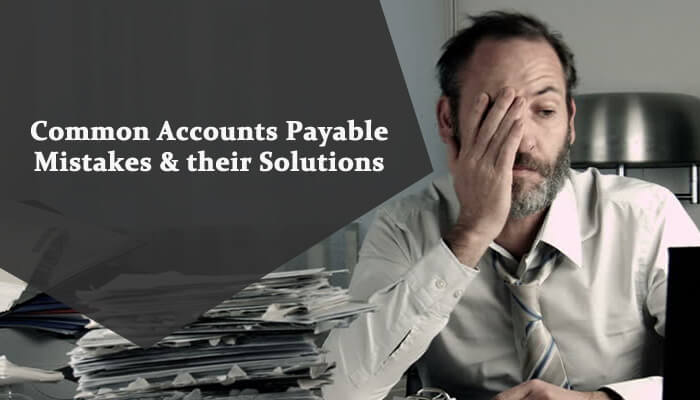Managing accounts payable is a vital facet of a company’s financial health, yet navigating this realm isn’t devoid of challenges. The efficient handling of AP processes is critical for maintaining smooth vendor relations, financial accuracy, and overall business integrity. However, various common accounts payable errors can impede these operations, leading to overpayments, delayed transactions, and even potential financial losses. In this blog, we’ll dive into an exploration of the most prevalent accounts payable mistakes encountered by businesses and offer insights on how to steer clear of these hurdles, ensuring a more efficient and error-free AP system.
Understanding Accounts Payable Pitfalls
Accounts Payable is a fundamental aspect of a company’s financial operations, focusing on the management of outstanding dues to vendors, suppliers, and service providers. While essential for business continuity, AP processes can encounter various pitfalls that impede smooth financial management.
In simplest terms, an invoice in B2B transactions is like an “IOU” – a document received from a vendor for payment. However, it’s not as straightforward as it seems.
Accounts Payable Errors and Ways to Avoid Them
-
Duplicate Payments
Receiving an invoice doesn’t always guarantee it hasn’t been paid previously. Vendors might unintentionally issue duplicate invoices. Without a reconciliation system in place, there’s a risk of inadvertently paying the same invoice twice. While vendors may eventually acknowledge the duplicate payment, it often goes unnoticed, resulting in financial write-offs and improper accounts payable cycle. Engaging external experts is advisable to prevent such occurrences, making accounting outsourcing services a viable solution.
-
Unauthorized Payments for Unordered Items
Paying for goods or services that were not ordered presents one of the common accounts payable errors. Fraudsters take advantage of this by sending unsolicited supplies at inflated prices. These scammers often study a company’s purchasing habits, sending unordered supplies and anticipating payment. If paid even once, this can lead to a cycle of recurring fraudulent bills.
-
Overlooking Early Payment Discounts
Many businesses overlook the potential cost-saving benefits of early payment discounts provided by vendors. Surprisingly, only 20% of organizations seize these opportunities. Prioritizing timely payments and negotiating favorable terms can result in savings of up to 5% or more, thereby enhancing the company’s financial performance.
-
Managing Check Payments
Using checks for payments presents a unique set of hurdles. Problems crop up when checks are dispatched but go uncashed. Furthermore, check payments come with inherent risks like fraud, manual processing hassles, and added costs for supplies and postage.
-
Untracked Unbilled Receipts
Failing to track unbilled receipts could result in goods or services received but not yet invoiced. This oversight leads to inaccuracies in financial statements, accounts payable transactions, and operational metrics.
-
Untimely Payment Processing
Delayed payment processing can have adverse effects, impacting relationships with vendors and suppliers, leading to strained partnerships, missed discounts, late payment penalties, and potential disruptions in the supply chain. Additionally, it hampers cash flow management and damages supplier trust, highlighting the importance of efficient payment processing systems.
-
Inadequate Invoice Data Validation
Inadequate invoice verification is a critical oversight that can result in significant accounts payable errors. Neglecting to verify invoice details against purchase orders or contractual agreements may lead to incorrect or excessive payments. Inaccurate or incomplete verification of invoice data can cause processing errors, resulting in payment discrepancies and undermining the accuracy of financial reporting.
-
Manual Data Entry Errors
Manual data entry errors are a persistent issue in the accounts payable process, with research revealing that a staggering 88% of spreadsheets harbor mistakes. These inaccuracies often result in payment delays, duplicate payments, and compromised financial reporting. Embracing automated solutions like optical character recognition (OCR) technology can slash manual data entry errors by up to 75%, ushering in a new era of enhanced accuracy and efficiency for businesses.
-
Lack of Internal Controls
Inadequate internal controls can lead to unauthorized payments or fraudulent activities. Without robust control measures, the risk of unauthorized access, data breaches, or even misappropriation of funds increases significantly.
-
Disorganized Record-Keeping
Disorganized or inadequate record-keeping can lead to missing or lost invoices, making it challenging to track payments, verify transactions, and comply with audits or regulatory requirements.
-
Ignoring Electronic Invoicing Opportunities
Failing to leverage electronic invoicing opportunities can result in inefficiencies. Electronic invoices offer automation possibilities, reducing manual labor and streamlining the entire AP process. Not adopting these methods can lead to higher processing costs and slower invoice approval times.
Let Experts Handle your Accounts Payable Process
Avoiding common accounts payable errors is crucial for business financial health and operational efficiency. Accounts payable outsourcing services to a reliable and experienced company is recommended to mitigate these challenges. Outsourcing ensures streamlined and accurate financial operations, allowing experts to handle these critical functions efficiently.
For more information on optimizing your accounts payable processes, contacting experienced professionals in outsourced accounting services is a wise decision. Contact us at +1 646-688-2821 or email us at info@accountingtotaxes.com to learn how outsourcing can streamline your accounts payable functions.
